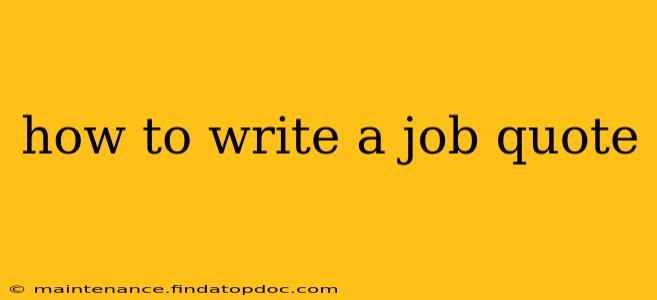How to Write a Winning Job Quote: A Comprehensive Guide
Winning a job often hinges on the quality of your quote. A well-crafted quote demonstrates professionalism, competence, and a clear understanding of the client's needs. This guide will walk you through the process of writing a job quote that increases your chances of securing the contract.
Understanding the Client's Needs: The Foundation of a Great Quote
Before you even think about pricing, thoroughly understand the client's requirements. This involves:
- Carefully reviewing the job description: Identify all aspects of the job, including materials, labor, timelines, and any specific requirements or preferences.
- Asking clarifying questions: Don't hesitate to ask the client for clarification on any ambiguous points. A misunderstanding can lead to costly revisions or disputes later.
- Conducting a site visit (if applicable): A site visit allows you to accurately assess the scope of the work and identify potential challenges or hidden costs. This is crucial for accuracy and avoids unpleasant surprises down the line.
Structuring Your Job Quote: Clarity is Key
Your quote should be clear, concise, and easy to understand. Here’s a suggested structure:
- Your Company Information: Include your company name, address, phone number, email address, and website.
- Date: Clearly state the date the quote was issued.
- Client Information: Include the client's name and address.
- Project Description: Briefly describe the project, referencing the job description or project number for easy identification.
- Detailed Breakdown of Costs: This is the most crucial section. Itemize all costs separately, including:
- Labor: Specify the hourly rate or daily rate for each worker involved, and the estimated number of hours or days required.
- Materials: List each material, its quantity, and unit cost. Specify the source or supplier if relevant.
- Equipment: If using specialized equipment, list it and its associated costs.
- Subcontractors: If you're using subcontractors, detail their costs separately.
- Permits and Licenses: Include any permit or license fees.
- Contingency: Add a small percentage (typically 5-10%) to cover unforeseen expenses. Be transparent about this.
- Taxes: Clearly state whether taxes are included in the price.
- Total Cost: Clearly state the total cost of the project.
- Payment Terms: Specify your payment terms (e.g., upfront deposit, progress payments, final payment upon completion).
- Warranty: Outline any warranties or guarantees you offer.
- Acceptance: Include a clear section for the client to sign and date, indicating their acceptance of the quote.
H2: What should be included in a job quote?
This question is answered extensively in the "Structuring Your Job Quote" section above. The key takeaway is to be comprehensive, detailed, and transparent in your cost breakdown. Avoid ambiguity; the clearer your quote, the less likely misunderstandings will arise.
H2: How do I price my services for a job quote?
Pricing your services requires careful consideration of several factors:
- Your labor costs: Calculate your hourly rate, factoring in overhead, profit margin, and benefits.
- Material costs: Obtain accurate quotes from suppliers and add a markup for handling and transportation.
- Equipment costs: Factor in rental or ownership costs of equipment.
- Overhead: Include costs like rent, insurance, and administrative expenses.
- Profit margin: Ensure your quote includes a sufficient profit margin to ensure profitability.
- Market research: Research competitor pricing to ensure your quote is competitive yet profitable.
H2: How long should a job quote be?
The length of your quote will vary depending on the complexity of the job. A simple job might require only a page, while a complex project might require several pages. The goal isn't to be lengthy, but to be thorough and comprehensive.
H2: What if I need to make changes to my job quote?
If you need to make changes to your quote after it's been issued, always communicate with the client promptly. Issue a revised quote clearly indicating the changes and the reasons for them. Get the client’s confirmation of the revised quote before proceeding.
Final Thoughts:
A professional and accurate job quote is crucial for securing contracts and maintaining positive client relationships. Take the time to thoroughly understand the project, create a detailed and well-organized quote, and communicate clearly with the client. This will significantly increase your chances of success.
